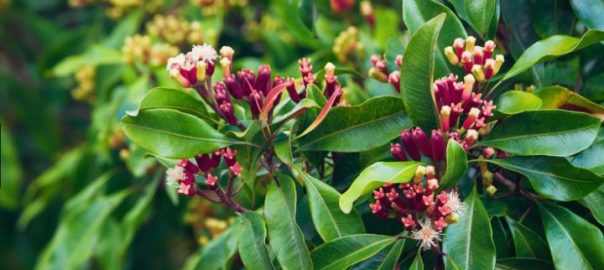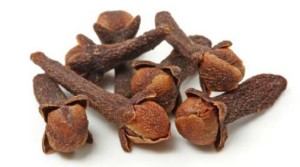
Description: Cloves are the aromatic flower buds of a tree in the family Myrtaceae, Syzygium aromaticum. They are native to the Maluku Islands in Indonesia, and are commonly used as a spice.
The clove tree is an evergreen that grows up to 8–12 m tall, with large leaves and crimson flowers grouped in terminal clusters. The flower buds initially have a pale hue, gradually turn green, then transition to a bright red when ready for harvest. Cloves are harvested at 1.5–2.0 cm long, and consist of a long calyx that terminates in four spreading sepals, and four unopened petals that form a small central ball.
Uses: Cloves are used in the cuisine of Asian, African, and the Near and Middle East countries, lending flavor to meats, curries, and marinades, as well as fruit such as apples, pears or rhubarb. Cloves may be used to give aromatic and flavor qualities to hot beverages, often combined with other ingredients such as lemon and sugar. They are a common element in spice blends such as pumpkin pie spice and speculoos spices.
A major component of clove taste is imparted by the chemical eugenol,and the quantity of the spice required is typically small. It pairs well with cinnamon, allspice, vanilla, red wine and basil, as well as onion, citrus peel, star anise, or peppercorns.
Benefits:
- Eliminates acne
- Kills parasites
- Improves blood circulation
- Reduces gum disease
- Boosts energy
- Natural anti-inflammatory
- Kills mold and fungus
Medicinal Benefits: Cloves are used in Indian Ayurvedic medicine, and western herbalism and dentistry where the essential oil is used as an anodyne (painkiller) for dental emergencies. Cloves are used as a carminative, to increase hydrochloric acid in the stomach and to improve peristalsis. Cloves are also said to be a natural anthelmintic.
In addition, clove oil is used in preparation of some toothpastes and Clovacaine solution, which is a local anesthetic used in oral ulceration and inflammation. Eugenol (or clove oil generally) is mixed with zinc oxide to form a temporary tooth cavity filling.
Clove oil can be used to anesthetize fish, and prolonged exposure to higher doses (the recommended dose is 400 mg/l) is considered a humane means of euthanasia
Essential Oil


